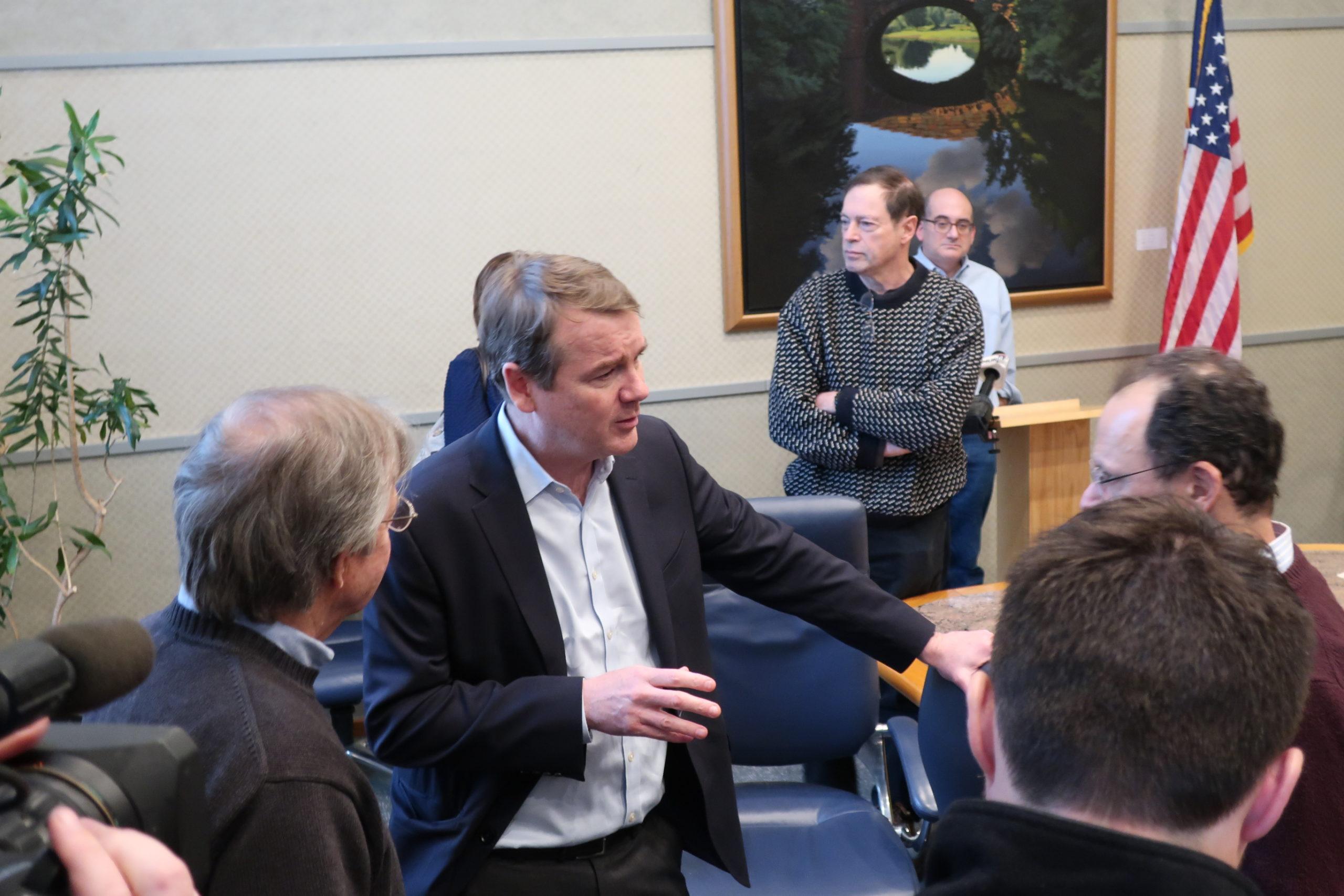
Going into the New Hampshire primary, Sen. Michael Bennet’s campaign bragged that he’d held more than 80 town halls in the Granite State.
It was a feat that made the math Tuesday night even starker. Bennet finished just short of a thousand votes, an average of 10 supporters for each of those appearances.
Bennet joined the presidential race last May, the 21st Democrat to enter the field and the second Coloradan. That he stayed in so long as higher-profile, better-funded candidates like Kamala Harris and Cory Booker dropped out confounded many observers. But Bennet argued to the last day of his campaign that his pound-the-pavement, retail-politics approach to wooing New Hampshire voters could overcome any shortcomings in funding and media attention.
“I think retail is important,” said University of Denver political science professor Seth Masket, who’s writing a book about the 2020 Democratic selection process. “But it's certainly not everything, and it can't always compete with a strong campaign presence and a couple of strong (debate) performances.”
Masket notes that polls showed many voters were still undecided going into primary day. He believes Minnesota Sen. Amy Klobuchar’s strong debate performance Friday night helped bring some of those undecided moderates to her camp, driving her to a third-place finish.
“Bennet just not having access to that debate stage, I think kind of shut him out of that conversation.”
Back Home, Voices Of Support (If Not Endorsements)
In Colorado, even some Democratic politicians who weren’t supporting Bennet for president said they were still rooting for him. For them, his exit from the race brought a sense of loss.
Democratic state Rep. Jonathan Singer of Longmont, who hasn't picked a candidate in the primary, said he reached out to Bennet after his withdrawal.
“Just wanted to shoot you a message and say thank you for being a voice of reason in an unreasonable time,” Singer texted.
Despite the poor showing in New Hampshire, Singer said he thinks Bennet’s presidential campaign raised his profile and will help his long-term political ambitions, whatever they might be.
“He built some good political capital and didn’t burn any bridges,” he said.
Democratic state Rep. Tracy Kraft-Tharp of Arvada, who has endorsed former vice president Joe Biden for the nomination, had hoped Bennet would surprise everyone in New Hampshire.
“I think he did a good job and I’m sure he learned so much. I felt disappointment for him. I’m sure his family thought the spark would go,” Kraft-Tharp said.
She believes all of the town halls and meet-and-greets Bennet hosted with voters in other states will make him a better U.S. senator, even though those events took place far away from Colorado.
Democratic Speaker of the House KC Becker has not endorsed any candidate yet but said Bennet’s centrist message resonated with her.
“I think he wanted to represent the Democrats in the party who want to focus on problem solving instead of being positional,” Becker said. “I think that's a really important message, especially at the national level, especially in Washington D.C things have become so polarized.”
One Less Moderate To Choose From
Bennet angled himself as an aggressively moderate alternative to Sanders and others. The policies laid out in his Real Deal platform were less ambitious than the plans other candidates are proposing, but Bennet emphasized that his ideas all came with cost estimates and ways to pay for them.
In the wake of Bennet’s announcement that he was leaving the race, many of the remaining candidates dropped into Twitter to praise him, and potentially position themselves to pick up a few of his voters.
Those regretting Bennet’s exit from the race include some moderate Republicans and former Republicans, who both say a Democrat of his stripe might have given them someone to vote for in the general election.
“You had me at Bennet, you lost me at Bernie,” quipped former state lawmaker Rob Witwer.
Now a registered independent, the former Republican said he would have been willing to vote for Bennet over Trump, despite being far apart from him on many issues.
“There’s moderation in terms of policy, and there’s moderation in terms of temperament. And I always felt like, if you have a moderate temperament, then you’re persuadable on policy, or at very least you’re able to work with people who disagree with you,” Witwer said. “And I think he has a moderate temperament.”
Conservative Denver Post columnist Krista Kafer, who is frequently critical of President Trump, agreed that Bennet would have helped Democrats attract people in the middle.
“Other presidential candidates have moved to the left on the Green New Deal, socialized medicine, and taxpayer support for abortion, stances which alienate moderate voters of both parties,” Kafer said. “Bennet would have provided moderate GOP and unaffiliated voters a reason to vote for a Democrat.”
Back To His Day Job
The nine months Bennet spent on the national campaign trail did come at the expense of time in Colorado and in Washington, D.C.
In 2018, Bennet missed only 0.8 percent of votes in the Senate, putting him around the middle of the pack of his colleagues according to the website GovTrack.us. In the past year, that jumped to 29 percent, although the tracking includes the several months when Bennet was undergoing treatment for prostate cancer before he announced his candidacy.
He also cut back on events in the state. During the August recess, when members of Congress generally return to their districts and hold constituent events, Bennet was conspicuously absent. In his stead, his staff held dozens of “listening events” in communities around the state, meeting one-on-one with residents of every county in Colorado over the course of last year.
Bennet did hold a town hall in Denver in November. Around 200 people attended the event, in which he talked about impeachment, his presidential platform and how he was juggling the run with his day job.
"I follow what's going on in Colorado when I'm here and when I'm not here," Bennet said. "I think that I've continued to represent the state well and that will always be my first priority."
Republican political consultant Tyler Sandberg believes Bennet did not represent the state well while running for president.
“While taxpayers paid Bennet $174,000 a year to be U.S. senator, he played hooky from his day job to mount an ill-fated campaign that was destined to fail from day one," Sandberg said. "Coloradans deserve to have a U.S. senator that cares enough to show up to work, instead of spending his time on a quixotic quest for another job.”
But Democrats in the state seemed inclined to forgive his absences.
“To be totally honest, it's not like the U.S Senate is getting a lot done anyways,” state Senate Democratic Majority Leader Steve Fenberg said. “I'm guessing that's part of why he made the calculation that it was the right time to run for president, because he probably doesn't feel like he's been incredibly productive in the U.S. Senate given the circumstances.”
Fenberg also said he felt Bennet was an authentic voice in the presidential race.
A shoestring campaign approach was necessary for Bennet, as his fundraising was dwarfed by the race’s leading candidates. He raised $6.1 million through the end of the year, with $700,000 of that coming from his Senate campaign war chest. That year-end campaign finance statement found him with just over a half-million dollars still in the bank.
Bennet now returns to his day job in the Senate, where his seat is up for re-election in 2022. He said he’s prepared to campaign for whoever wins the Democratic nomination for president, and also to help the party retake the Senate. That effort is likely to bring him into direct conflict with his Colorado colleague, Republican Sen. Cory Gardner, who is considered one of the most vulnerable Republican senators up for reelection in 2020.
Editor's Note: An earlier version of this article stated that Rep. Jonathan Singer planned to endorse either Sen. Sanders or Sen. Warren. Singer currently has no plans to endorse in the Democratic presidential primary.









